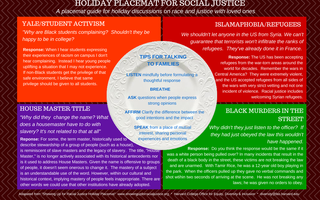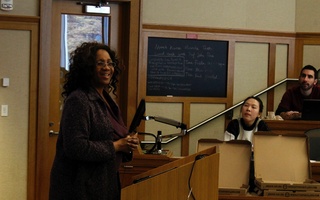I’ve been puzzling over it ever since I started college. Why is it that I find myself so often agreeing with a socially just cause, but none of its proponents?
Eventually, I arrived at an answer: the social justice warrior. That walking campus cliché dedicated to rooting out today’s noxious isms and phobias—wherever they exist, and wherever they don’t.
You might object here to the absurdity of making a nuanced argument on the basis of a simplistic trope about an entire, diverse class of people, and, of course, you would be right. But that’s exactly the error I find the social justice warrior makes.
Contra their professed credo of openness, allyship, and solidarity, the social justice warrior’s complaints often hinge on a simplistic assumption of a person’s identity from their race, gender, or sexual orientation.
Heard of a white person doing public service in Africa? Quickly diagnose a case of white savior complex. Does a student like the music, culture, and customs of another nation? Call cultural appropriation. Know of any group that doesn’t mirror America’s demographic distribution exactly? Decry the institution as systemically oppressive.
Too much of what I read and see is exactly this kind of unthinking rejection, one that emerges from a philosophy of activism for activism’s sake. On campuses, this often takes the form of student activists seeking out any evidence of real, nationally salient injustices on their own campuses, seizing on—and often misrepresenting—any shred that they may find, and presenting this as evidence of a pervasive, all-encompassing system of oppression.
Take the recent example of the black lives matter movement on Harvard’s campus. Clearly, the disproportionate rates of arrest, incarceration, and police brutality of African-Americans merit an oppositional movement.
But when a group of Harvard students sought, unknown to most, to delay Primal Scream by four-and-a-half minutes, each minute symbolizing an hour Michael Brown’s body remained on a Ferguson street this summer, the primal screamers, cold, wet, naked, and almost certainly intoxicated, refused.
Of all the reasons that the movement failed to gain five minutes from the naked mass that night, indifference to police brutality against blacks might be assumed to be low on the list. And yet, some of the protesters would later call themselves “sure of our collective anger by the extreme lack of sensitivity.”
In searching for any seeming equivalence between the conditions of their often cloistered campuses and politically salient causes, these kind of stunts abound. The allure of publicizing a negative reaction seems more the purpose than the professed aim itself.
The same can be seen from Divest Harvard, which, on May 1, 2014, parked a student who refused to move in front of Mass. Hall, requiring the Harvard University Police Department to arrest him. A gleeful press release sent out the same day, hailed the “first arrest for the growing fossil fuel divestment movement” and criticized the administration that would, in their words, “rather arrest their own students and have police force us out of the way than speak to us civilly about this important issue.”
How uncivil, indeed, for President Drew G. Faust not to engage the man blocking her door with the respect he deserved!
Nearby, Smith College forced International Monetary Fund Christine Lagarde, one of the world’s most prominent and influential women, out of delivering last year’s commencement address for promoting “imperialist and patriarchal systems that oppress and abuse women worldwide.”
To a hammer, everything looks a nail, and to the social justice warrior, every elite looks like an oppressor.
This impulse toward seeking the bad from anything good, to protesting progress for not being immediate utopia, leads to the most disturbing trend of the social justice warrior: a near-constant assumption of bad faith.
Read more in Opinion
Embrace Your HouseRecommended Articles
-
University CalendarFACULTY OF ARTS AND SCIENCES. Meeting at University 5, 4 P. M. *SEMITIC MUSEUM LECTURES. I. "Hammurabi as Warrior, Organizer,
-
Yardlings Maul Warrior Icemen Late in Game to Win Eighth, 6-3The freshman hockey team stayed close to a pesky Merrimack squad for a period and a half and then overpowered
-
D.C. Police Arrest 2500 More ProtestersWASHINGTON -As Mayday antiwar demonstrators reverted to tactics of nonviolent civil disobedience, Washington police arrested more than 2500 people yesterday
-
 The Placemat Problem
The Placemat Problem -
 Union Leader Calls for Racial Justice at Law School Event
Union Leader Calls for Racial Justice at Law School Event













